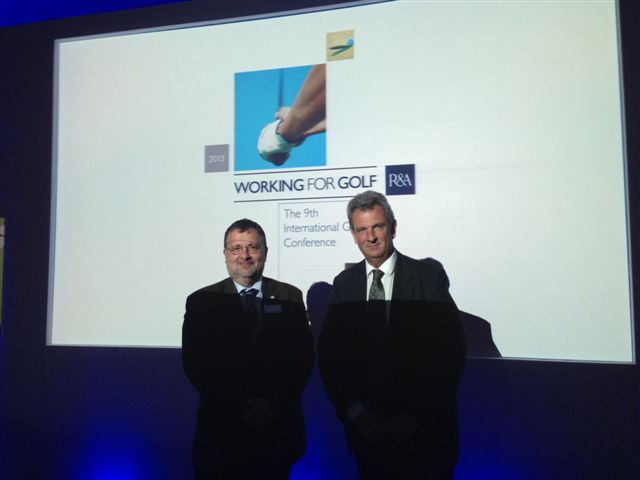Back
THE R&A WORKING FOR GOLF 9TH INTERNATIONAL CONFERENCE
08/05/2013

William Beck, Malta Golf Association President, and Paul Stoner, Royal Malta Golf Club Chairman, have just returned from a four day visit to the home of golf at St Andrews where they attended the 9th International Golf Conference organised by the R&A.
Held every four years, this year’s conference was attended by over 200 delegates from 66 different countries.
The conference dealt with various topics that are influencing today’s game and teed off with the hot topic regarding the proposed change in the Rules of Golf to prohibit anchored strokes during putting. With the US PGA showing disagreement with this proposal, discussions are still ongoing to reach overall consensus on this matter so as to avoid the US PGA from disassociating itself from the R&A and the USGA governing bodies. A joint statement is expected to be issued by the governing bodies in a few days time. Efforts are also being made to simplify the Rules by the next review which is due in 2016 and in a few weeks’ time the R&A website will make it possible for players and golf rules enthusiasts – at different levels – to go through Rules education online. The first day’s agenda also included a presentation on whether technology is making the game lose its traditional values due to the ever increasing improvement in club manufacturing as well as in the make of the ball. The discussions were led by Peter Dawson (Chief Executive R&A); David Rickman (Executive Director Rules R&A); Wally Uihlein (President Acushnet Company); Steve Otto (Director Research and Testing R&A) and Colin Montgomerie.
The second day opened by a presentation from Joe Beditz Chief Executive of The National Golf Foundation. The NGF is on an exercise to register each golf course in an effort to understand the presence, strength and decline of the game throughout the world. Duncan Weir (Executive Director Working for Golf R&A) then offered his thoughts on the game’s strengths whilst Martin Yates also from the R&A argued on the affects that the (slow) Pace of Play is having on the game and how this problem can be addressed. The day’s other presentations included an innovative “Tee it Forward” campaign to make golf more fun for senior golfers and beginners; the various possibilities to take the game to urban areas and the efforts being undertaken by the Golf Union of Wales to develop the game.
In the afternoon, the delegates and their hosts were teamed up in fourballs for a competition on the Old Course with the best two Stableford scores aggregated towards the team’s score. The fun aspect of the afternoon was augmented when each delegate’s swing was recorded on the 17th (Road Hole) via a Trackman video device and the analysis made available at the end of the conference. Unfortunately, the Malta delegates, playing in different teams, did not feature on the wining podium. Their swing video recording remains totally confidential although it can be revealed that both players managed to drive over the shed that obstructs the 17th fairway’s view and they found their ball in play on the fairway albeit via very different tee shots.
The International Olympic Committee, the International Golf Federation’s role in securing golf’s presence in the games from 2016, the qualification process and the thought behind the design of the course at Rio de Janeiro were the first items that were presented on the third day. Apart from Peter Dawson’s input, the morning’s papers were forwarded by Christophe Dubi (Sports Director at the IOC), Anthony Scanlon (Executive Director at the IGF), Juan Margets (Vice President at the International Tennis Federation) as well as Gill Hanse (the architect behind the Rio course). Sir Matthew Pinsent – four times Olympic rowing champion – ended the morning session with an emotional look back on his achievements and his views on the sacrifices that an athlete has to endure to achieve success.
The afternoon session discussed the World Amateur Ranking System; the work being undertaken to protect Golf’s Heritage as well as a brief overview of the progress being achieved towards making golf sustainable and environmentally friendly. These papers were presented by Andy McDonald (Manager of the WAGR); Angela Howe (Museum & Heritage Director) and Steve Isaac (Director – Golf Course Management) all from the R&A. Mike Davis – Executive Director of the USGA – then gave an overview of the six systems that oversee the handicapping of golfers throughout the world and the concerted efforts that are being undertaken to try and establish a worldwide unified system.
The conference was concluded by a summary from Peter Dawson – Chief Executive of the R&A.